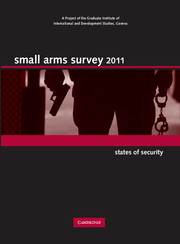Book contents
- Frontmatter
- Foreword
- Contents
- About the Small Arms Survey
- Notes to readers
- Acknowledgements
- Introduction
- Chapter 1 Larger but Less Known: Authorized Light Weapons Transfers
- Chapter 2 Fact or Fiction?: The UN Small Arms Process
- Chapter 3 Procurement and Policy: Police Use of Emerging Weapons Technology
- Chapter 4 A Booming Business: Private Security and Small Arms
- Chapter 5 Protected but Exposed: Multinationals and Private Security
- Chapter 6 Ethos of Exploitation: Insecurity and Predation in Madagascar
- Chapter 7 Reforming the Ranks: Public Security in a Divided Côte d'Ivoire
- Chapter 8 Securing the State: Haiti before and after the Earthquake
- Chapter 9 Balancing Act: Regulation of Civilian Firearm Possession
- Index
Chapter 6 - Ethos of Exploitation: Insecurity and Predation in Madagascar
Published online by Cambridge University Press: 05 March 2012
- Frontmatter
- Foreword
- Contents
- About the Small Arms Survey
- Notes to readers
- Acknowledgements
- Introduction
- Chapter 1 Larger but Less Known: Authorized Light Weapons Transfers
- Chapter 2 Fact or Fiction?: The UN Small Arms Process
- Chapter 3 Procurement and Policy: Police Use of Emerging Weapons Technology
- Chapter 4 A Booming Business: Private Security and Small Arms
- Chapter 5 Protected but Exposed: Multinationals and Private Security
- Chapter 6 Ethos of Exploitation: Insecurity and Predation in Madagascar
- Chapter 7 Reforming the Ranks: Public Security in a Divided Côte d'Ivoire
- Chapter 8 Securing the State: Haiti before and after the Earthquake
- Chapter 9 Balancing Act: Regulation of Civilian Firearm Possession
- Index
Summary
INTRODUCTION
In 2001 Madagascar stepped back from the brink of probable civil war. The country's new leader, President Marc Ravalomanana, seemed poised to pave the way for long-term stability and economic prosperity. The international community provided widespread support as prospects appeared to improve, but Ravalomanana had built his power on fragile foundations. In the years that followed, opposition grew from key economic, military, and political stakeholders, and, by late 2008, Ravalomanana's power base began to unravel. A series of disturbing events ensued–including a mutiny at an army barracks and the massacre of civilians by presidential security forces on the main square in the capital, Antananarivo–precipitating a political crisis that continued through late 2010. By that time, international donors had largely suspended their non-humanitarian assistance.
Madagascar is a deeply impoverished country. In the absence of financial support from and oversight by the international community, the ‘transition’ government is signing unfavourable contracts, primarily with Chinese and other Asian investors, who are gaining unchecked access to the island's wealth of resources. The extraction and transportation of these resources–including timber, seafood, beef and rare animal species, coal, uranium, gold, diamonds, and other precious stones–allegedly relies on the tacit cooperation and collusion of members of the country's security forces. Moreover, rates of armed robbery, often committed with military weapons, appear to have risen sharply since 2008, as has the presence of international criminal networks.
- Type
- Chapter
- Information
- Small Arms Survey 2011States of Security, pp. 167 - 192Publisher: Cambridge University PressPrint publication year: 2011
- 1
- Cited by



